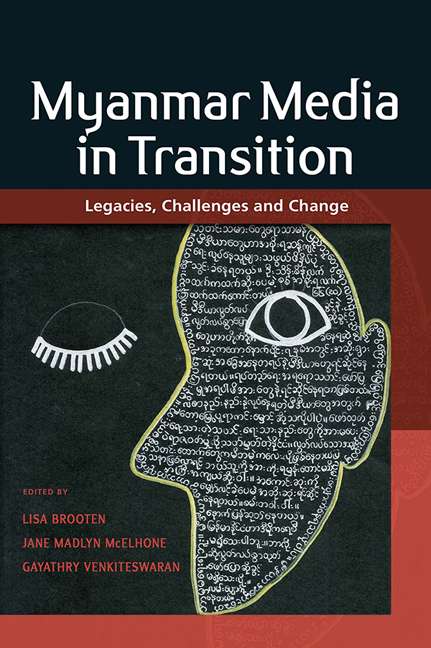Book contents
- Frontmatter
- Contents
- Contributors and Editors
- Burma or Myanmar? A Note on Terminology
- 1 Introduction: Myanmar Media Historically and the Challenges of Transition
- Part I Structural Constraints and Opportunities
- Part II Journalism in Transition
- Part III Creative Expression
- Part IV Society and Media
- Epilogue: Media Studies in Myanmar – Where Do We Go from Here?
- Index
1 - Introduction: Myanmar Media Historically and the Challenges of Transition
Published online by Cambridge University Press: 07 September 2019
- Frontmatter
- Contents
- Contributors and Editors
- Burma or Myanmar? A Note on Terminology
- 1 Introduction: Myanmar Media Historically and the Challenges of Transition
- Part I Structural Constraints and Opportunities
- Part II Journalism in Transition
- Part III Creative Expression
- Part IV Society and Media
- Epilogue: Media Studies in Myanmar – Where Do We Go from Here?
- Index
Summary
At the end of August 2018, as this book was about to go to press, the United Nations Human Rights Council (UNHRC) released its report summarizing the main findings and recommendations of its Independent International Fact-Finding Mission on Myanmar. The report outlines serious human rights violations and abuses in Kachin, Shan and Rakhine States. It recommends that six senior military figures be investigated for genocide against the Rohingya, including Myanmar's armed forces commander-in-chief Senior General Min Aung Hlaing, and that the case be taken up by the International Criminal Court (ICC), or alternatively that an ad hoc international criminal tribunal be created (Human Rights Council 2018). The report notes that “The role of social media is significant. Facebook has been a useful instrument for those seeking to spread hate, in a context where for most users Facebook is the internet. Although improved in recent months, Facebook's response has been slow and ineffective” (p. 74). Facebook quickly responded to the report's release by removing the accounts of eighteen high-profile army figures in Myanmar, including Senior General Min Aung Hlaing, and fifty-two Facebook pages, which had a combined total following of close to twelve million users (Facebook 2018).
A few days later, two Reuters journalists, Wa Lone and Kyaw Soe Oo, were sentenced to seven years in prison under the Official Secrets Act over accusations of holding secret government documents that they intended to share with international media and the ethnic armed group Arakan Army (Sithu Aung Myint 2018). The two were arrested in December 2017 after investigating a massacre of Rohingya men and boys in the coastal town of Inn Din in northern Rakhine State. After responding to a call from police officers, who met them in a restaurant and handed them documents, the journalists were arrested for having the documents in their possession. As they were being taken away from the court after the sentencing, Wa Lone was quoted as saying, “We know we did nothing wrong. I have no fear. I believe in justice, democracy and freedom” (Shoon Naing and Aye Min Thant 2018, ¶22). The arrest and subsequent sentencing were met with national and international condemnation, as was the rejection of their appeal in early 2019.
- Type
- Chapter
- Information
- Myanmar Media in TransitionLegacies, Challenges and Change, pp. 1 - 56Publisher: ISEAS–Yusof Ishak InstitutePrint publication year: 2019

